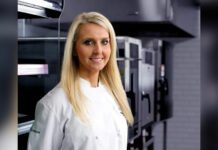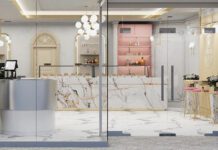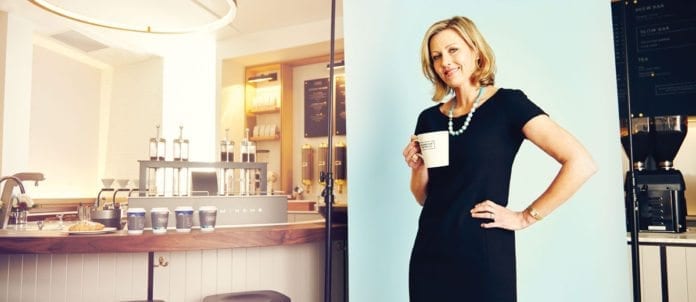If you know the enemy and know yourself, you need not fear the results of 100 battles.” The classic line, written in Sun Tzu’s Art of War in 6th century B.C. could just as easily have been spoken by Second Cup’s latest trailblazer and CEO, Alix Box. Fearless, determined, and pointedly strategic, Box is the entrepreneurial superhero who is reinventing the Second Cup brand — one franchise at a time.
A seasoned vet at the retail game, Box’s business acumen is like no other. With a résumé that touts, most recently, executive roles as senior VP of Retail at Holt Renfrew and a 10-year run as vice-president of Operations at Starbucks Coffee Company — as well as earlier career stints at Michel’s Bagette and Mmmmuffins — Box has experience in the reinvention game.
At both Holt’s and Starbucks, Box cultivated a renewed team spirit and drove up sales and growth. When she started at Starbucks in 1997, for example, the company ranked third in Canadian sales and its green siren-of-the-seas Seattle symbol wasn’t yet present on every street corner. All that changed under Box’s watch and it’s no coincidence she was the perfect choice for Second Cup: her intimate knowledge of its competition is, perhaps, the ultimate advantage.
Second Cup’s chairman, Michael Bregman, was banking on it. When the brand’s founder tapped her for the position, Box hadn’t yet sat in the CEO chair. Since her assignment, Box has undertaken a top-to-bottom restructuring of the company, revealing an unwavering dedication to her corporate vision. It’s all part of a larger plan to reposition Second Cup as one of the major powerhouse coffee competitors in Canada. “The truth is, I have a passion for specialty retail and people,” says Box. “Second Cup always has been an iconic Canadian brand and at the core of that brand was unrivaled coffee quality. That’s at the heart of the whole concept.”
Her first foray into Second Cup’s corporate culture was meeting with franchisee owners across the country. Box went into the conversation open-minded and ready to hear the worst. “I sat down with every franchisee to hear their thoughts and feelings about the brand,” Box explains. “We especially needed to build those relationships again. Overall, they were just really dissatisfied and frustrated.”
From those meetings, Box took quick action to remedy the recurrent franchisee stories of feeling neglected and disconnected from the brand. Her first step was a direct show of appreciation to its front-line staff. “Within the first 115 days, we reduced our own royalties, allowing the franchisees to earn more,” she says. It was a gesture that unanimously garnered Box the support she needed to bolster the energies of an already tired and disheartened franchise network.
“Second, we restructured our office to specifically cater to the needs of franchisees. We also renamed it ‘Coffee Central’.” This was a symbolic move on Box’s part to decrease the hierarchal nature of the company. She also instituted a policy whereby Second Cup’s Coffee Central — or “main office”— was required to respond to franchisee inquiries within a 24-hour time-frame. “Part of the disconnect happened because franchisees would call head office and sometimes never hear back,” she says. Gemma and Kartik Alton, who own nine Second Cups between them, can testify to the huge changes Box has implemented. “She’s not afraid of change,” says Kartik. “I really respect the fact she increased our gains by about 2.5 per cent for every franchise. That’s quite dramatic. There has never been a give-back like that in our company’s history.”
“It’s this kind of action that gives everyone renewed faith in the company,” says Gemma. “You get the sense she has our best interests at heart.”
In June 2015, Box hired chief financial officer Barbara Mallon to execute the restructuring plan. “She was looking for a partner to move the plan forward,” explains Mallon, who is responsible for everything from IT, supply chain, real-estate planning and food categories to legal issues. “We hadn’t known each other prior, but were introduced through a member of the board. Funnily enough, we met for a coffee.”
According to Mallon, Box’s leadership style is one-of-a-kind. “She’s a very good leader of people,” says Mallon. “Her team is truly a team and she involves everyone. The fact that she works on a collaborative basis is huge. One person’s issue becomes all of ours to discuss, which is great because it means there are no silos created between staff.”
At the end of 2014, Box made the Second Cup’s future tangible with the ultimate prototype café at King and John Streets in Toronto. The contemporary, open-concept space features what Box was seeking to highlight — “a premium coffee experience from the music to the cups to the food.” Other than the reminiscent scents of Second Cup’s famous Paradiso blend, there is little resemblance between the old and new Second Cup aesthetic.
The “Café of the Future” features natural lighting, a central baking case, a “slow bar” for coffee aficionados to converse with baristas while charging their various devices and an artisanal Steampunk machine. The space also offers a number of different seating arrangements — tables, benches and a bar area. Even the workers’ dress code has changed. “Originally, it was all black, which connotes a sort of fast-food feel,” says Box. “Now people can wear their own denim and a choice of a white or black shirt.” New denim aprons are also part of the more modern, hipster look.
The operation has been open for two years and has seen 46 per cent growth in each year since. Box hopes the concept will be equally as successful in the newly renovated Commerce Court, Toronto Eaton Centre and at Montreal’s Gare Centrale (Central Station) locations.
“That was her baby from the start,” explains Mallon. “With the ‘Café of the Future’, when I look at that huge accomplishment, it all came from Box — her drive for action.” Mallon credits Box with bringing the new vision for Second Cup to life, so it would be a statement not just to franchisees, but to the public. “Alix has a strong bias for action,” says Mallon. “I have worked in other companies where you would meet on it again and again. But Alix isn’t like that. If you want to change something, she wants a timeline and you are held accountable. That’s not something you see every day.”
In the cut-throat retail market, Box’s decision to reinvent Second Cup as upscale was especially astute. For one, it immediately withdrew the brand from directly competing with the Tim Hortons and McDonald’s rivalry for the best value/ low price point coffee. It also positioned itself to lure in more millennials through Box’s commitment to local Canadian communities.
As the only Canadian-owned coffee franchise, Box wanted to highlight all things Canadian in its stores. In May 2016, Second Cup launched “Batch 49” coffee, which reflects Canada’s position — literally and figuratively — in the world. As well, all renovated Second Cups will feature a mural by a local artist of its local monuments and neighbourhood landmarks. Canadian music by emerging bands is also key. Box also collaborated with local artists — Matt Andres of British Columbia, Adrian Forrow of Ontario, and Zela Lobb from Quebec — to design specialty paper cups.
“The millennial customer is someone we want to attract,” says Box. “And we know they respond to that connection to the local and to quality.” To lure them, Box also installed a rewards program, a mobile app (subscribed to by over 200,000 users as of May 2016) and has cultivated a daily online presence on various social-media sites. It has also become the exclusive coffee brand of Air Canada.
In keeping with the theme of supporting local businesses, Box changed the Second Cup’s bakery selection to reflect fresh-never-frozen treats. It was a tall order, but sustainable if the very best local bakeries could be sourced. At this point, 80 per cent of the baked goods are sourced locally. “This allows us to feature local flavours or special dishes that are neighbourhood-driven,” says Box. “This means we can be relevant locally. If you want an almond croissant in Montreal, it should also be baked in Montreal.”
Though Second Cup’s coffee has always been Rainforest Alliance Certified, Box reviewed each step of the coffee production line. “From sourcing to roasting to marketing, I reviewed each and every step to ensure we were delivering the best we could.” While Box remains mum on what specifically she upgraded in the coffee timeline from bean to cup, she says: “We are focused on the entire process. We want to be the very best at everything we do. Full stop.”
By the end of her three-year plan (2018), nearly 30 to 40 per cent of Second Cups will be completely renovated in line with Box’s vision for the “Cafés of the Future.” Not only is Second Cup’s redux bound to rock the coffee wars — it will make Canadians proud to be part of the revolution.
Volume 49, Number 4
Written By Jennifer Febbraro


















